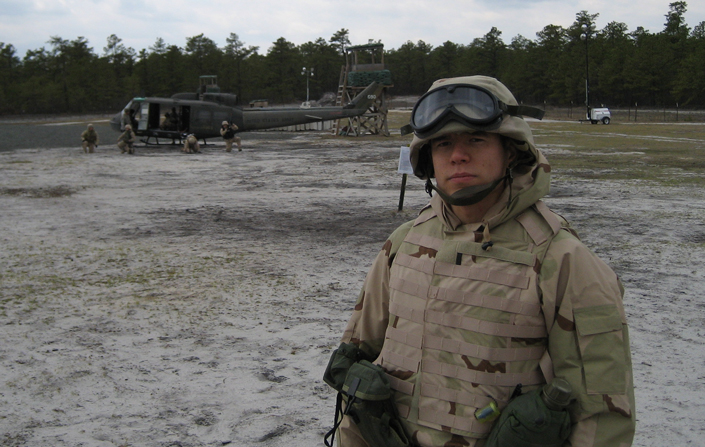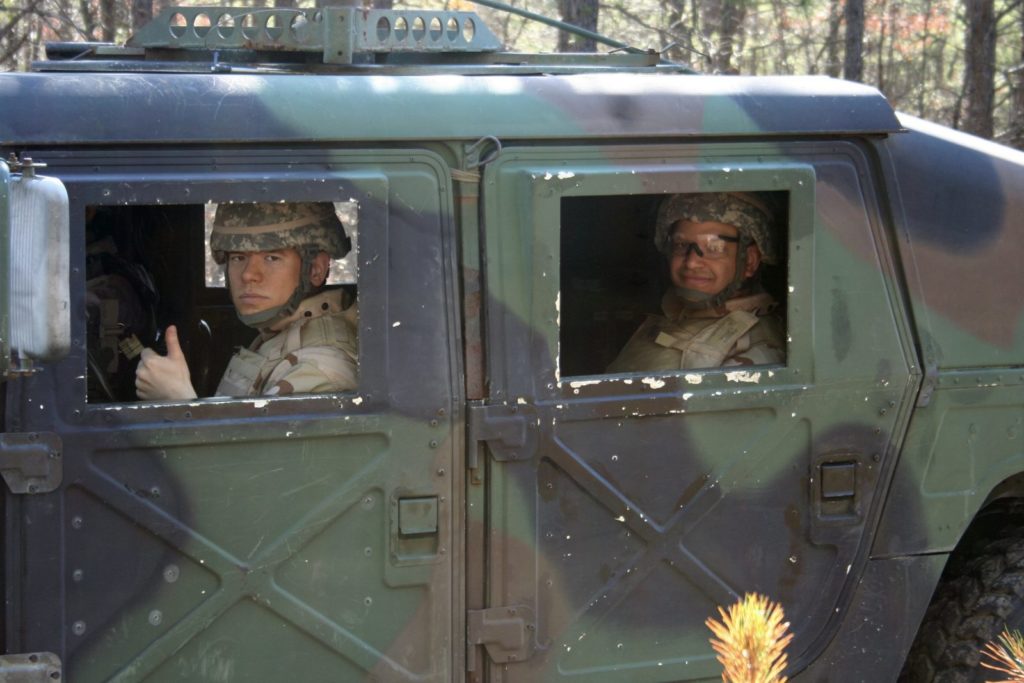Air Force vet sees disruptive tech as key to changing the world
Organizing hackathons in innovation hubs and dev shops; advising ministers of education on their strategy and policies; helping to connect cybersecurity startups with venture capital — it’s all just another day’s work for Andrew DeBerry. A major in the Air Force Reserve and a veteran of intelligence and special operations deployments, DeBerry is a senior program manager for emerging technologies at Microsoft, focusing on virtual and augmented reality, smart systems, and HoloLens. It’s a natural step in a military and civilian career dedicated to using technology to make a difference in the world.
“I’ve always had a passion for using innovation to bring communities together and solve problems, especially for those most in need,” DeBerry says.
DeBerry overcame adversity growing up in a single-father military household in the South. DeBerry’s own work ethic and ambition were supported by a strong community of friends, relatives and educators who took time to give him advice and steer him to educational opportunities.
“The genuine kindness and selflessness from friends and families has been a deep guiding force for me,” DeBerry says. “I’m grateful for the folks who’ve been with me through thick and thin, and want to embrace their spirit of leadership for service”
He earned a full scholarship in aerospace engineering at Notre Dame University, with minors in Arabic, public policy and Catholic social teaching. After graduation DeBerry entered the Air Force, serving three overseas tours with assignments in intelligence and special operations. In Afghanistan, he took part in undercover operations targeting “dark” networks. After six years, he found himself wanting to build communities in a more personal way. He read books about grad school at night with a headlamp in his tent in Kandahar, and decided to transition to the Air Force Reserve so he could pursue graduate studies full time.

DeBerry earned a fellowship to the Wharton School of the University of Pennsylvania, and graduated with honors from a dual degree program, earning an MBA in strategy and a master’s in Arabic. As his graduation drew near, DeBerry began his career search. He nearly accepted a promising position in consumer smartphone technology, but then Microsoft’s Worldwide Public Sector Education team discovered him and offered a chance to combine his business skills with his ongoing passion for making a difference in people’s lives. At Microsoft, DeBerry spent three years launching projects aimed at bridging the digital divide, from advising governmental leaders on their education and technology policies to extending the reach of Office 365 to global markets. Then he jumped at an opportunity to join the Developer Innovation team.
“My job right now is to get people excited about how much they can achieve,” DeBerry says. “I’m most excited about piloting smart hacks that connect enterprise innovation groups with pioneer developers.”
Today DeBerry works with new, disruptive forms of human-computer interaction such as speech, identity recognition, virtual reality and connected intelligence systems. He says the work is focused on Microsoft CEO Satya Nadella’s vision for more personal computing and also offers communities the chance to pursue transformation through technology. Nadella’s vision fits neatly with his own.
“This deep purpose of innovation for impact has taken me down some surprising routes, from the military through business school to the front end of technology, in ways that are deeply meaningful,” DeBerry says. “They fit with what Microsoft wants to do at its core, which is helping people make a difference. We have the opportunity to solve some of the world’s most pressing problems, and this ecosystem of developer shops, hackathons, community influencers are three key pillars. They give us a lot of power — more power than people realize they have — for helping people to achieve more.”
In his role in the Air Force Reserve, DeBerry is part of Defense Innovation Unit X, a new initiative in the Silicon Valley by the Secretary of Defense to accelerate innovation, especially for creative collaboration, analytics, and cybersecurity. Venture capital, big tech, and startup initiatives focus on accelerating the department’s core while exploring new groundbreaking solutions.
“DoD innovation sounds like a contradiction in terms but is long overdue,” DeBerry says. “But if the DoD frames itself as one of the world’s top-funded VCs, aspiring tech leaders may consider starting a conversation.”
DeBerry is passionate about the use of technology to stabilize societies, unlock smart partnerships and improve people’s daily lives. “I want to bring out the human in an increasingly digital world,” he says. He feels strongly that anyone who wants to make a difference should get their hands dirty and work hard to learn the deep technical skills and knowledge that will open up opportunities in industry, community leadership, governmental agencies and more.
“I thought about leaving engineering my freshman year,” DeBerry says. “My senior high school guidance counselor got mad at me; she said, ‘You will not have influence if you give up your engineering degree now.’ She steered me back into it even though it was kind of painful. But having the technical skill is important. The market and technology are at a point where people with innovative ideas and tools can make a meaningful impact more easily than the generations before.”

